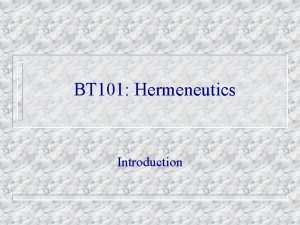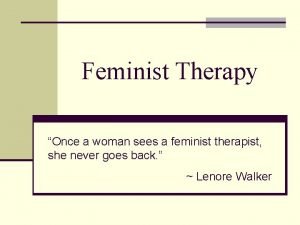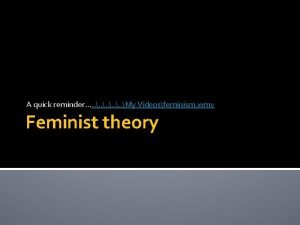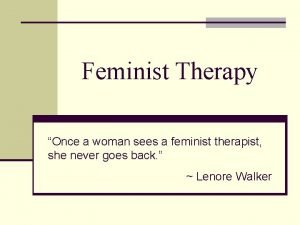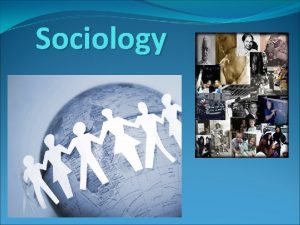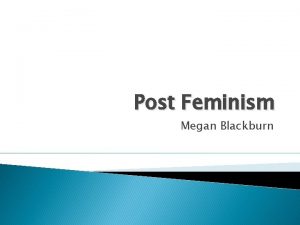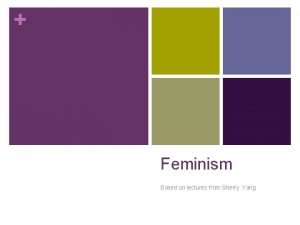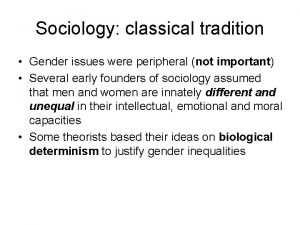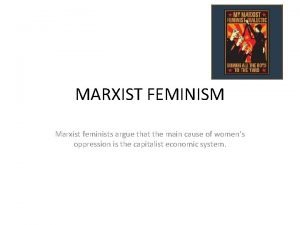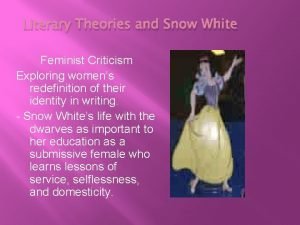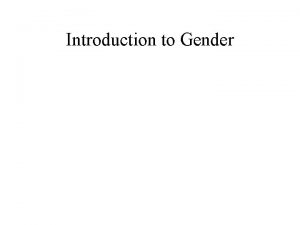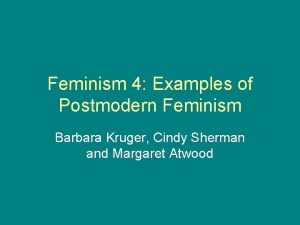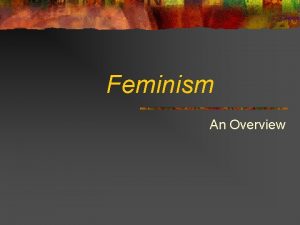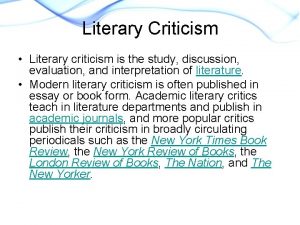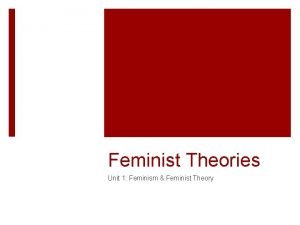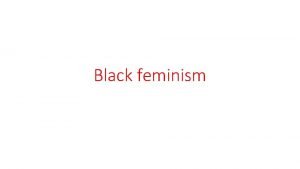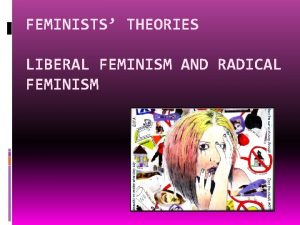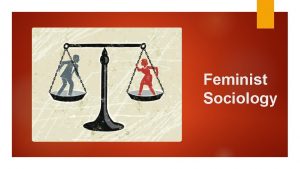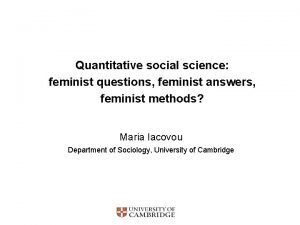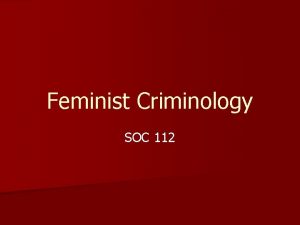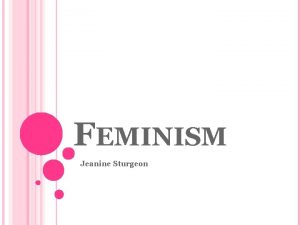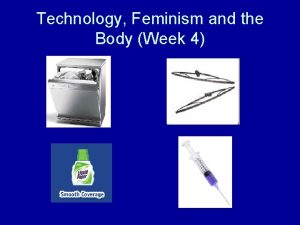FEMINIST HERMENEUTICS According to Lisa Isherwood Feminism is



























- Slides: 27

FEMINIST HERMENEUTICS • According to Lisa Isherwood, “Feminism is a way of looking at society and centering the concerns of society on women and men. ” • It offers “an analysis of theology, a critique of theory, thought patterns and of the praxis of religions and a model of doing theology in a transformative way. ” • It is based on the experiences of women.

WOMAN EXPERIENCES 1. Oppression. 2. Exploitation and subjugation by men. 3. Motherhood. 4. Condemnation by men. 5. Exclusion in leadership of male structures such as the Church, politics, business, etc.


THEOLOGICAL AND BIBLICAL BASIS 1. The God of Israel was almost always on the side of the oppressed, widows, orphans, and, migrants. 2. Jesus Christ preached against all sorts of discrimination. 3. He came as a liberator and allowed women to follow him in his ministry.

4. Women were the first witnesses of his resurrection. 5. Some women co-worked with Paul in his missionary work. 6. Some scholars think that some women worked as deaconesses in the early church. 7. In most Christian communities, women form the majority of members.

TYPES OF FEMINIST THEOLOGY 1. RADICAL FEMINISTS • These denounce all patriarchal structures in the society and church. • They depict God as “Mother. ” • They denounce all gender insensitive language and they want it replaced by gender inclusive language. • Some advocate the abandonment of male dominated churches. • They claim that women’s experiences are unique. • They condemn men as oppressive.

2. LIBERAL FEMINISTS • These would like to transform the society and church from within. • They criticize some of the church’s practices but do not advocate the abandonment of the church by women. • Most of them are balanced in the manner they fight for woman emancipation.

3. THIRD WORLD FEMINISTS • Most come from Africa, Asia, and Latin America. • Most of them are concerned with the attainment of woman basic rights, such as; • health care, • dignity, • education, • Clean water

• They claim that their experiences are not similar to those of Western women. • One outstanding Feminist theologian from Africa is Mercy Amba Oduyoye who claims that African women are burdened by the facts that they are women, black, and poor. • Some are diseased, battered, and belong to polygamous marriages.

FEMINIST HERMENEUTICS • The following information comes from Wisdom Ways, by Elizabeth Schussler Fiorenza.

1. HERMENEUTICS OF EXPERIENCE • This is the starting point of conscientization and emancipation. • It starts with a critical reflection on how experience in the biblical text is shaped by our socio-political location. • Biblical interpretation is centered on woman experiences of exploitation and oppression.

• When interpreting the bible feminist experiences therein must be given priority. • In addition to that, experiences of contemporary women must be read into the bible. • In any given biblical passage the experience of women must be critically analyzed.

WEAKNESSES 1. Although women all over the world share certain common experiences, it is misleading to generalize all their experiences. 2. Women experiences differ from one place to another, from one social class to another. 3. Some women experiences are socially constructed.

2. HERMENEUTICS OF SUSPICION • This one places on all biblical texts “Caution – could be dangerous to your health and survival”. • Biblical passages that out rightly denigrate women must not be read with “empathy, appreciation and consent. ” • The Kyriocentic text should not be taken at face value. • It should be traced to its interests of domination.

WEAKNESSES • Some people have internalized biblical authority as unquestionable taboo. • Some women still find edification from such scriptures. • Male conservatives in the church don’t accept that. • Sometimes emotions are over-emphasized at the expense of reason and faith.

3. HERMENEUTICS OF CREATIVE IMAGINATION • This method seeks to generate utopian images/visions that have not yet been realized. • It encourages the interpreter to dream a different world of justice and well-being.

• The space of imagination is that of freedom where boundaries are crossed, possibilities explored, and time becomes relativized. • It calls for the re-experiencing and reembodying of biblical situations.

• The reader is called upon to step into the shoes of the woman mentioned in the passage and try to retell the story in a way that is liberated from patriarchal perspective. • The reader must participate in the biblical character’s struggles and from them revision a new future.

WAYS OF RE-IMAGINING • Story-telling, eg. The story of Miriam, Mary and Martha, Herodias. • In Art, eg, The African/ Latino Mary. • Music • Literature. • Dance. • Drama. Etc.

PROCESS OF INTERPRETATION 1. Identify a biblical passage in which there is a female character. 2. Put yourself into the shoes of that woman. 3. Relate the biblical woman’s experiences in a new empowering way. 4. Conceive how change can be brought about.

ADVANTAGES 1. This is entertaining as drama. 2. It encourages creative thinking. 3. It empowers women. 4. It re-discovers and reconstructs hidden information about women. 5. It re-establishes the identity of the biblical character and the reader.

DISADVANTAGES • Each interpreter ends up with a different story and interpretation. • Drama might arouse emotions. • Some interpreters might be tempted to exaggerate.

CRITIQUE OF FEMINIST INTERPRETATION 1. POSITIVES 1. It highlighted the plight of women. 2. Gave biblical interpreters another method. 3. Changed the Christian worldview. 4. Some Christian denominations ordain women. 5. Encouraged women to get involved in theological studies. 6. It forced men to think of gender equality. 7. It challenges the abuse of women.

2. NEGATIVES 1. It over-romanticizes women experiences. 2. There are many different woman experiences. 3. Women from different cultural and social stations have different wants and needs. 4. Some women have been oppressed for too long and they have internalized that oppression, and because of that it is now very difficult to liberate them.

5. Although Feminist methods of hermeneutics are based on the bible, the same bible is irredeemably patriarchal. There is very little information on women. 6. Some demands by feminist interpreters are not realistic. 7. Some feminists mistake equality for sameness. 8. In some cultural setups poverty prevents women from getting involved in fruitful biblical interpretation.

9. There are times when women are their own enemies. 10. Some patriarchal structures are male dominated that it becomes difficult for women to penetrate them. 11. Our Lord, Jesus Christ, did not clearly resolve the issue. 12. The project has been hijacked by radicals.

CONCLUSION • Despite the listed setbacks. • Some churches have made great strides in empowering women. • Some societies have helped women to get higher political posts. • In Zimbabwe there is Affirmative Action. • Many countries have female heads of state.
 Lion king everything the light touches script
Lion king everything the light touches script Beekeeping documentary
Beekeeping documentary Hermeneutics quiz
Hermeneutics quiz Hermeneutics 101
Hermeneutics 101 Critical race theory tenets
Critical race theory tenets Hermeneutics class
Hermeneutics class Hermeneutics theory
Hermeneutics theory Susan gasson
Susan gasson Cultural feminism example
Cultural feminism example Marxism and feminism similarities
Marxism and feminism similarities Postmodern feminism
Postmodern feminism The story of an hour literary devices
The story of an hour literary devices Feminist therapy
Feminist therapy Feminism in the secret life of bees
Feminism in the secret life of bees Principles of feminism
Principles of feminism Bourgeois feminism
Bourgeois feminism Feminist waves
Feminist waves What is post feminism
What is post feminism Feminism in the crucible
Feminism in the crucible What is feminism
What is feminism Radical feminism slideshare
Radical feminism slideshare Marxist feminism theory
Marxist feminism theory Snow white theory
Snow white theory Marxist feminism example
Marxist feminism example Postmodern feminism
Postmodern feminism Postmodern feminism
Postmodern feminism Feminism literary approach
Feminism literary approach Formalist/structuralist approach
Formalist/structuralist approach



